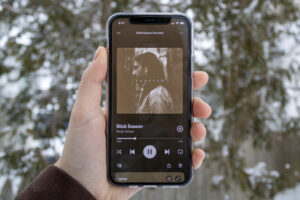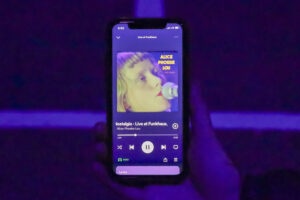Rating: 5 stars
Solange, sister of pop culture icon Beyonce, has had quite the music career. Receiving much critical acclaim for her work, Solange has opted for a more introspective sound, pursuing the lush sounds of brooding rhythm and blues that has pushed the boundaries of the genre in new and interesting directions.
On March 1, Solange released her fourth album, “When I Get Home,” as a follow up to the immensely praised “A Seat at the Table,” which she released in 2016. Expectations for her new album were high as “A Seat at the Table” received such accolades as Album of the Year from Pitchfork magazine. “When I Get Home” is similar to her last project, but that isn’t a bad thing; the quality is there, the instrumentation is sparse and thoughtful; her vocals flutter and sway.
The album clocks in at 39 minutes and features 19 tracks, with 10 of them under two minutes. This gives “When I Get Home” a sort of transient feeling — sounds switch up often, ideas don’t stay too long, choruses are not often repeated if they exist at all. One experiences the album more in waves of changes that flow together than indistinct, separate songs.
The first song, “Down With the Clique,” features a shuffling, jazzy drum machine and an oscillating synth with Solange beginning in a falsetto register. Few artists can create such a mellow, futuristic, loungy mood quite like Solange and this track is a very good demonstration of it.
The song “Stay Flo,” features the most urgent drum rhythm of the album, making it a uniquely groovy track. Again, she doesn’t miss the opportunity to show her vocal prowess, with harmonizing background vocals. The song also features the artist and producer Metro Boomin who adds some vocal support.
Not looking to produce this album alone, Solange enlisted the help of numerous artists. Ranging from hip hop and pop to R&B and beyond, artists like Pharrell, Dev Hynes from Blood Orange, Earl Sweatshirt and many others were involved in the creation of the album.
“When I Get Home” is an album full of powerful messages relating to race, and tracks like “Almeda” are good examples of this. “Almeda” features lots of repeated phrases and gives messages of strength in the lines like “Black faith still can’t be washed away.”
In many ways, Solange illuminates the black experience and does so in really interesting and moving ways. Combining her knack for nuanced insights with her immense vocal talent and her repeatedly successful instrumental experimentation, Solange’s “When I Get Home” is an important and alluring album on many fronts. It would not be far off to call it my favorite album of the year so far; I think it will be hard to beat.











